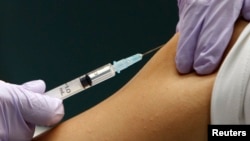A common tuberculosis vaccine is being investigated as a treatment for type 1 diabetes, which is caused by an attack on the body’s own tissues and affects mostly young people. The Bacillus Calmette-Guerin (BCG) vaccine has shown promise in reversing some of the symptoms of diabetes and other autoimmune diseases.
The BCG vaccine is the most commonly administered vaccine in the world, given to newborns in countries where tuberculosis is still prevalent. It increases the production of TNF, a hormone that kills off the TB bacterium.
In people with type 1 diabetes, T cells which normally are one of the body's main infection fighters go rogue and attack and destroy the pancreas, which produces the hormone insulin. Without insulin to convert food to energy, sugar levels in the blood rise to dangerously high levels. That can lead to severe diabetic complications, including blindness and kidney failure.
But scientists have discovered that in addition to killing off TB bacteria, the increased levels of TNF caused by BCG also destroy the T cells that attack the pancreas.
Denise Faustman, director of the Immunobiology Laboratory at Massachusetts General Hospital, has been doing experiments with BCG and diabetes.
In early studies of mice with diabetes and a small human trial, Faustman said the TB vaccine dramatically reduced the number of harmful T cells and lowered high blood sugar levels to the normal range.
The vaccine even raised insulin levels in those who were producing very little.
“Around the world, there’s hundreds of happy diabetic mice in end stage of disease that are very pleased that BCG has been administered to them and they are all healthy. So now in humans with diabetes, we’re trying to replicate that data... to see if we can have as dramatic an effect,” said Faustman.
Researchers are set to begin a 5-year-long clinical trial with 150 people who have had diabetes for 15 or 20 years or more.
Investigators plan to give adults between the ages of 18 and 60 two injections, four weeks apart, of either BCG or a placebo, and then a yearly injection for four years, and see whether they improve.
BCG has been shown to be effective in the treatment of bladder cancer, and Faustman notes that there are more than a dozen studies currently underway around the world investigating whether the vaccine can reverse a number of autoimmune diseases.
“I think in the next five years, we’re going to see lots and lots of data in many different clinical settings of abnormal immune responses, whether it’s allergies or autoimmunity, whether it’s multiple sclerosis or type 1 diabetes, of how well the vaccine can reverse these terrible afflictions that we get in modern society,” she said.
Multiple sclerosis is the number one crippler of young adults, in which the body's immune system attacks brain cells.
The BCG vaccine is widely available and generic, so it would not be a money-maker for drug companies that are unlikely to fund research to see whether the vaccine could be a treatment for autoimmune diseases.
As a result, Faustman’s research is being funded by charitable organizations, including the Iacocca Foundation.







